Key takeaways:
- Anti-war activism emphasizes the human cost of conflict, advocating for policy changes that prioritize diplomacy over aggression.
- Inclusivity in activism is essential for fostering collective strength and ensuring diverse voices are heard, enriching discussions and strategies.
- Building trust and authentic relationships is crucial for successful collaborations and forming effective coalitions within the anti-war movement.
- Engaging underrepresented voices and creating safe spaces for dialogue deepens understanding and empathy, leading to more impactful activism.
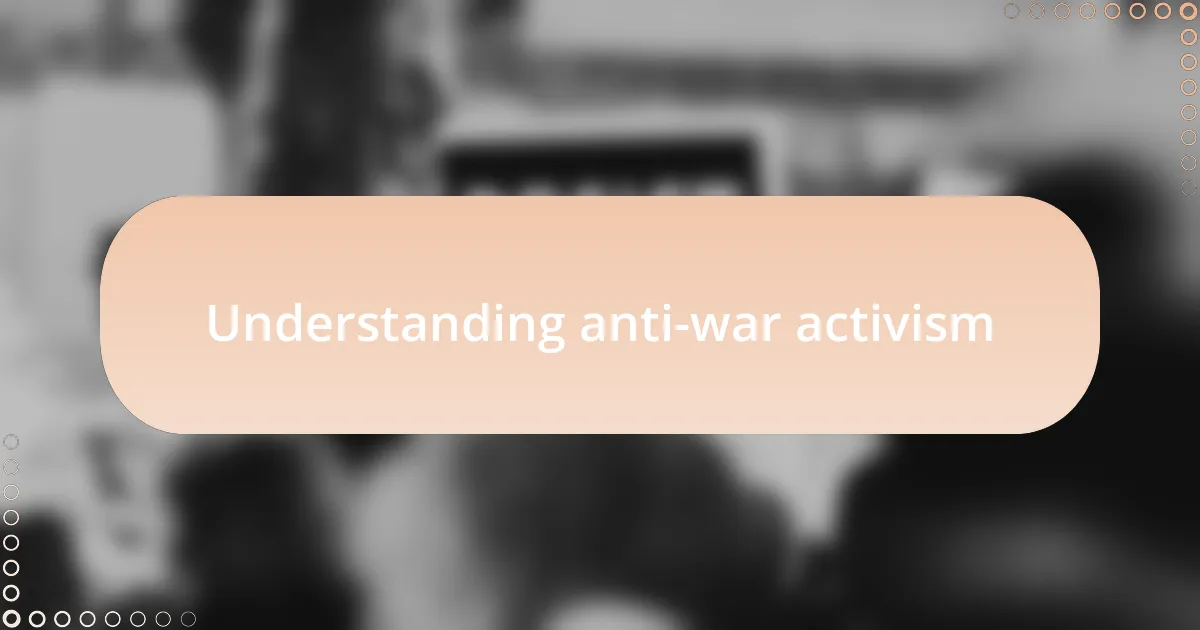
Understanding anti-war activism
Anti-war activism is grounded in the belief that conflict creates more harm than good, often perpetuating cycles of violence and suffering. I remember volunteering at a local peace rally where we all shared stories about how war had disrupted our lives. Listening to those experiences struck me deeply; it made me question why we continue to tolerate such suffering.
At its core, anti-war activism challenges the narratives that glorify military action, shifting the focus toward the human cost of war. I often find myself asking, “What if we viewed soldiers as our neighbors, instead of as distant heroes?” This perspective makes it easier to see the interconnectedness of our communities and how war impacts everyone, not just those on the battlefield.
Moreover, anti-war activism is a collective call for policy changes that prioritize diplomacy and dialogue over aggression. During a forum I attended, a speaker passionately pointed out that every war starts with a conversation—but too often, that conversation spirals toward violence. It got me thinking: how can we redefine those initial discussions to foster peace instead?
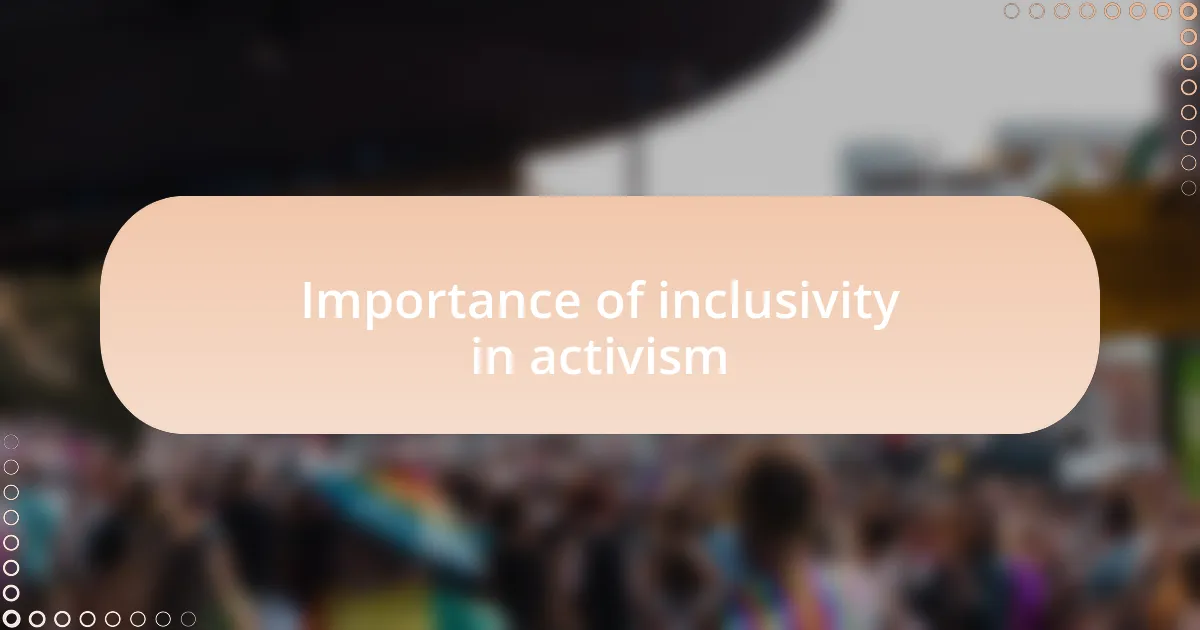
Importance of inclusivity in activism
When it comes to activism, inclusivity is not just a nice-to-have; it’s essential. I distinctly remember a community meeting where individuals from diverse backgrounds shared their experiences related to war—each story was unique, yet they all resonated with a common theme of loss. This collective sharing underscored the reality that different voices contribute vital perspectives, challenging the dominant narratives that often overlook marginalized experiences.
Inclusivity in activism fosters collective strength, creating a tapestry of shared goals and understandings. I once joined a collaborative project with youth groups from various neighborhoods, and the synergy we experienced was electrifying. It made me realize that when we come together, we amplify our message, ensuring that everyone feels they have a stake in the outcome, rather than feeling alienated by the dialogue.
Furthermore, embracing inclusivity invites critical conversations that might otherwise remain unaddressed. One day, during a workshop on anti-war strategies, a participant introduced an idea that had never crossed my mind about the role of mental health in conflict resolution. It was a powerful moment that showed me how diversifying our discussions not only enriches our approaches but also helps us to understand the complexities behind the fabric of war and peace. This kind of dialogue can spark innovative solutions that are truly reflective of the communities we aim to serve.
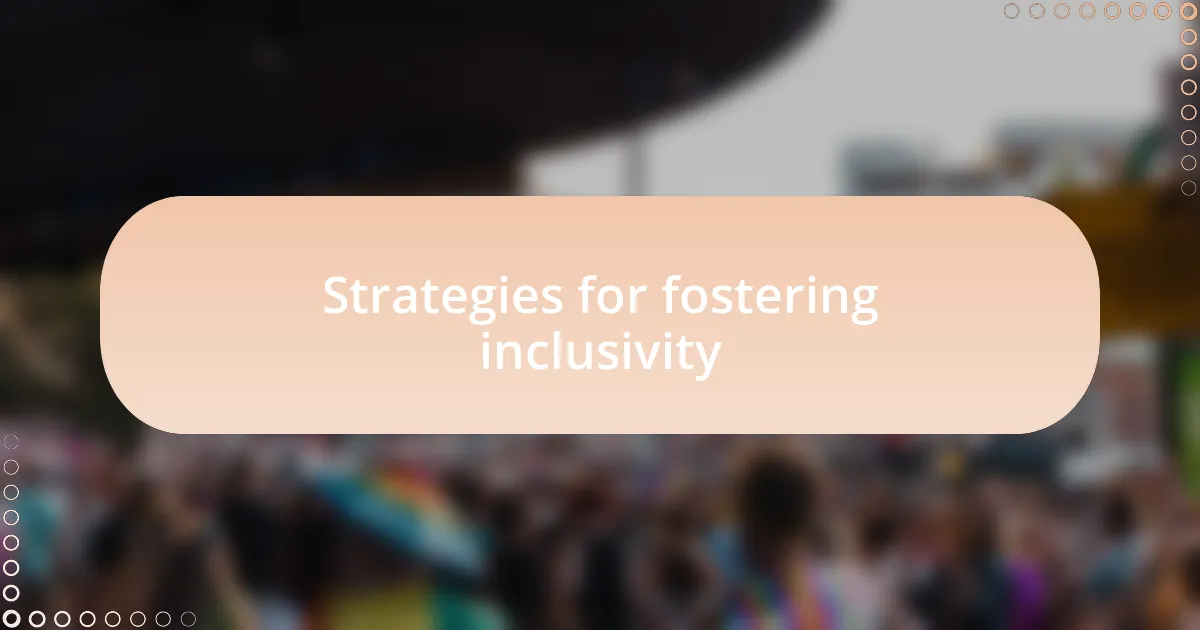
Strategies for fostering inclusivity
To foster inclusivity in activism, I found that creating safe spaces for dialogue is crucial. I vividly recall organizing a series of open forums where people felt comfortable sharing their thoughts and feelings about war. The emotional weight of those conversations taught me the value of listening; it became clear that when everyone feels heard, healing and unity can genuinely begin.
Another effective strategy is to actively seek out and amplify underrepresented voices. I remember collaborating with a local artist whose work reflected the impact of war on their community. By featuring their perspective prominently in our campaigns, we not only showcased their talent but also deepened our understanding of how conflict touches lives differently. This experience reinforced my belief that inclusivity can drive more authentic messaging.
Finally, education plays a significant role in promoting inclusivity. I once joined a workshop focused on understanding various cultural intersections within activism. The insights I gained from engaging with people from different backgrounds opened my eyes to biases I hadn’t recognized in myself. It made me wonder: how often do we take the time to learn from experiences that are not our own? By prioritizing educational initiatives, we can dismantle barriers and cultivate a deeper sense of commitment to inclusive activism.
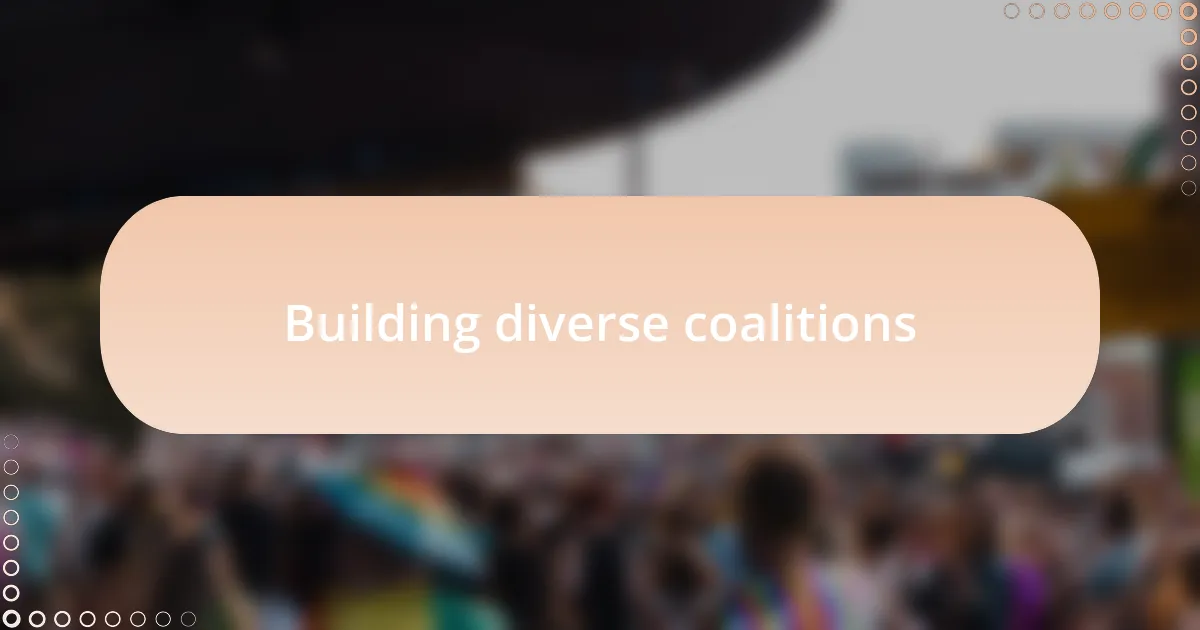
Building diverse coalitions
Building diverse coalitions requires purposeful outreach and connection. In my experience, I approached local community groups that were traditionally overlooked in the anti-war movement. Getting to know their unique challenges and perspectives was eye-opening; I remember a conversation with a community leader who shared how war disproportionately affected their neighborhood. It drove home the point that inclusive activism isn’t just about numbers—it’s about genuine understanding and partnership.
I discovered that hosting joint events could be a powerful way to build bridges and showcase diversity. One time, I co-organized a multi-cultural rally that featured speakers from diverse backgrounds. The energy in the room was palpable; as different voices shared their stories, I felt a deep sense of unity that transcended our differences. It made me realize: how often do we think about the strength that comes from celebrating our unique experiences together? Creating spaces for these diverse narratives not only enriches our activism but fuels our collective purpose.
Furthermore, I learned that trust takes time. While collaborating with a range of organizations, I noticed that our initial meetings were often marked by skepticism. It wasn’t until I committed to consistent communication and transparency that the collaboration flourished. Reflecting on this, I ask myself: How can we expect meaningful change without building authentic relationships? Sustaining these connections is essential for forming coalitions that truly resonate with the communities we aim to uplift.
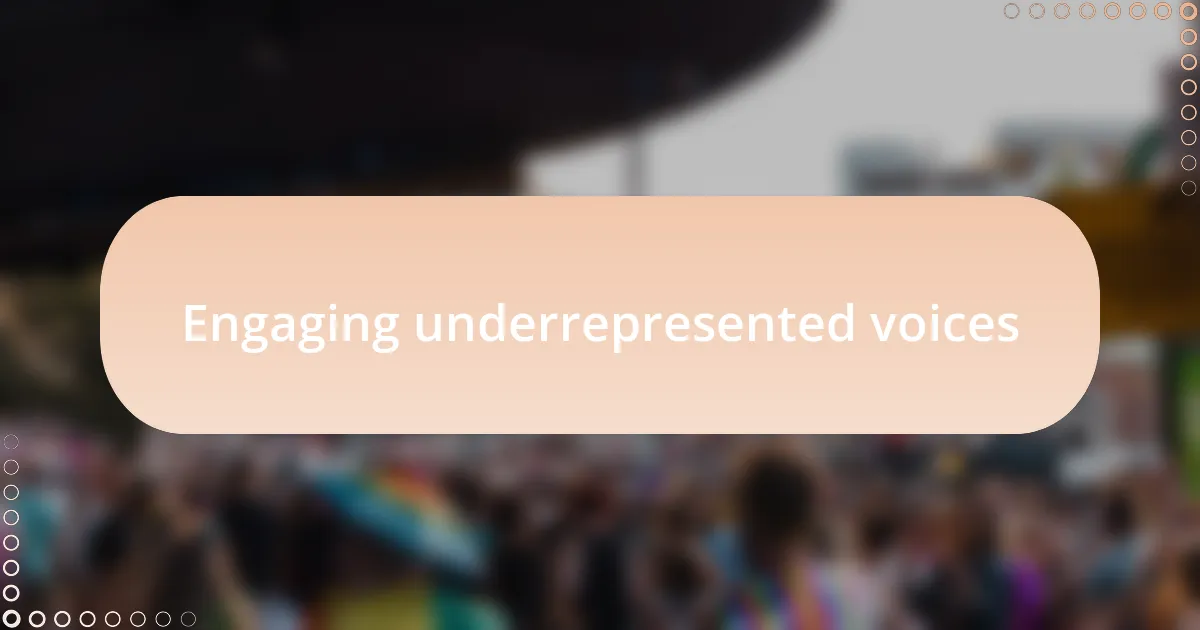
Engaging underrepresented voices
Engaging underrepresented voices involves more than just inviting them to the table; it’s about actively listening and amplifying their stories. I recall a workshop I conducted where we featured a panel of activists from marginalized communities. Each speaker illuminated the intricate ways war impacted their lives, revealing deep-seated fears and hopes. This experience made me ask: How often do we really make space for these vital narratives, and what are we missing by not doing so?
One particularly moving moment was when an indigenous activist spoke about her community’s historical trauma and ongoing struggles with militarization. Her words resonated deeply, sparking an emotional response in the audience. In factoring in their perspectives, we didn’t just gain insight; we fostered empathy that could lead to actionable change. It left me pondering: How can our activism evolve if we genuinely incorporate these essential yet often unheard voices?
I’ve also found that creating an environment where underrepresented voices feel safe to express themselves is crucial. In one project, we established small talking circles that encouraged open dialogue without fear of judgment. This supportive atmosphere allowed people to share experiences that were often silenced. I think about the power of vulnerability in activism—how can we truly advocate for peace if we don’t understand the pain and resilience of those around us?
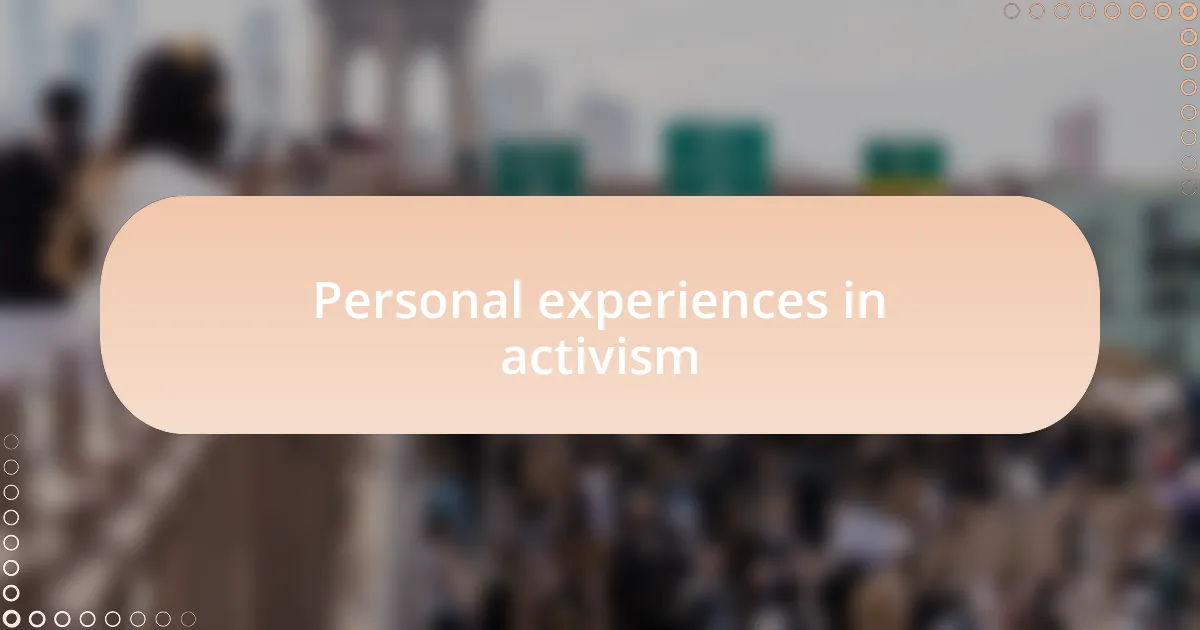
Personal experiences in activism
I remember my first protest rally. It was overwhelming, with diverse voices chanting for peace. But what struck me the most was the young activist who shared her experience of her brother being deployed. The raw emotion in her voice made me realize that behind every statistic, there are real lives affected by war. Have you ever felt the weight of such personal stories?
Volunteering with a local anti-war organization introduced me to activists from various backgrounds. I was particularly moved by an elder who recounted his experiences during conflicts long past. His perspective reminded me that the struggles against war span generations. How often do we overlook the wisdom that comes from lived experience in our quest for change?
I also facilitated a community art project where participants expressed their feelings about war through creative outlets. One participant’s painting, depicting a family torn apart by conflict, lingered in my mind long after the event. It made me wonder: if art can transcend language barriers, aren’t we missing a critical point by not integrating creative expressions in our activism to foster deeper connections?

Lessons learned from my journey
While navigating my activism journey, I learned that listening is essential. During a community meeting, I was initially excited to share my thoughts, but the powerful stories from others quickly shifted my perspective. Their experiences added depth to my understanding of the anti-war movement. Have you ever paused to truly listen to someone’s struggle and felt the impact of their words?
Another significant lesson involved recognizing the importance of allyship. At one point, I collaborated with a group focused on social justice that highlighted the intersections of various issues. Through this collaboration, I realized that inclusivity enriches activism. It often made me ask: how can we tackle war if we ignore the voices of those most affected by its consequences?
Finally, I discovered the value of vulnerability in activism. Sharing my fears and uncertainties during group discussions created a sense of community that was both healing and empowering. I began to understand: when we open up about our fears regarding war and activism, we allow others to step into their authenticity too. Have you found strength in sharing your vulnerabilities with others in your journey?